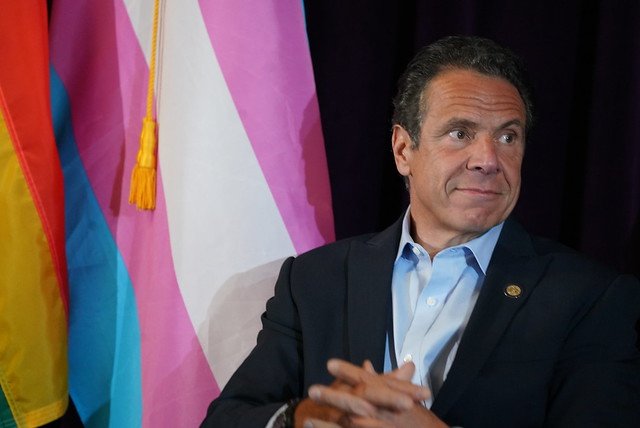Cuomo Downplays Getting 'Locked Out' Of Rent Reform Negotiations
June 13, 2019, 9:34 a.m.
'The legislature got together and jammed the governor,' said one lobbyist. 'His people were telling [industry representatives] not to panic, that they'd tweak the bills, but he was locked out and never got a chance.'

Governor Cuomo at a June 10th rally to legalize gestational surrogacy and ban the gay and trans panic defense.
When asked two weeks ago about reports that the State Senate and Assembly planned to dramatically revamp state rent regulations without his input, Governor Andrew Cuomo chuckled.
"They should go back and take Constitutional Law 101," Cuomo told WNYC's Brian Lehrer. "The theory makes no sense. 'Negotiate a package, send it to the governor, don't include him.' Okay, then I won't sign the package. Then you'll have no rent reform laws. Then what do you do? It makes no sense."
Then, the first part happened, but the second part didn't.
Senate Majority Leader Andrea Stewart-Cousins and Assembly Speaker Carl Heastie negotiated a legislative package that will eliminate vacancy decontrol, limit rent hikes related to capital improvements and allow other regions of the state to opt into the rent regulation program. The legislation will make the changes permanent, rather than requiring renewal every four years.
On Tuesday, the two leaders jointly announced their unilateral deal, which will affect 1 million rent-regulated apartments and 2.4 million New Yorkers.
And on Wednesday, Cuomo said he would sign the legislation, ignoring the pleas of the real estate industry, which called on him to veto the package.
"The legislature got together and jammed the governor," said one lobbyist connected to developers, builders and landlords. "His people were telling [industry representatives] not to panic, that they'd tweak the bills, but he was locked out and never got a chance."
Cuomo downplayed his exile from negotiations.
"We're frequently not involved in legislation," he said at a hastily convened press conference to promote other agenda items for the remainder of the 2019 legislative session. Cuomo's general counsel, Alphonso David, pointed out that the legislature has passed hundreds of bills without input from the governor.
But Cuomo was very involved the two other times rent regulation renewal came up during his tenure, in 2011 and 2015. On both occasions, deals did not come together before the laws technically expired, requiring the governor to authorize a temporary extension.
This time around, in the days leading up to the legislative deal, Cuomo said he would sign whatever emerged — whether it was a more liberal version from the Assembly, a more moderate version from the Senate or something in between. But he also said he doubted the two sides would come together in time to meet the June 15th deadline.
"The governor's great power is in the budget process," said Hank Sheinkopf, a Democratic political consultant. "It's much less later in the session."
Cuomo seemed to acknowledge as much, saying that while he was still talking to legislative leaders and individual lawmakers about his top-priority items for 2019, he was mainly asserting himself "when I feel I can make a difference."
He cited bills to expand the definition of sexual harassment and to end the religious exemption for vaccines as examples of legislation he thought he could influence. He has said he has relatively little power over more controversial bills, such as legalizing marijuana or authorizing driver's licenses for undocumented immigrants.
Cuomo also said the pro-tenant package vindicated his longtime assertion that large corporate donors don't influence his political decisions.
"This should upend that whole theory," Cuomo said. "There's no connection between political contributions and legislative outcome."
Sheinkopf predicted Cuomo's donors would be frustrated but ultimately would stick with him.
"What are they going to do—take him on?" Sheinkopf said. "The amount of construction he controls, the billions of dollars he spends on projects—he's immune from prosecution. You give to him, because you have to, and he does whatever he wants, because he's the governor."
Fred Mogul is the Albany and politics reporter for WNYC. You can follow him on Twitter @fredmogul.